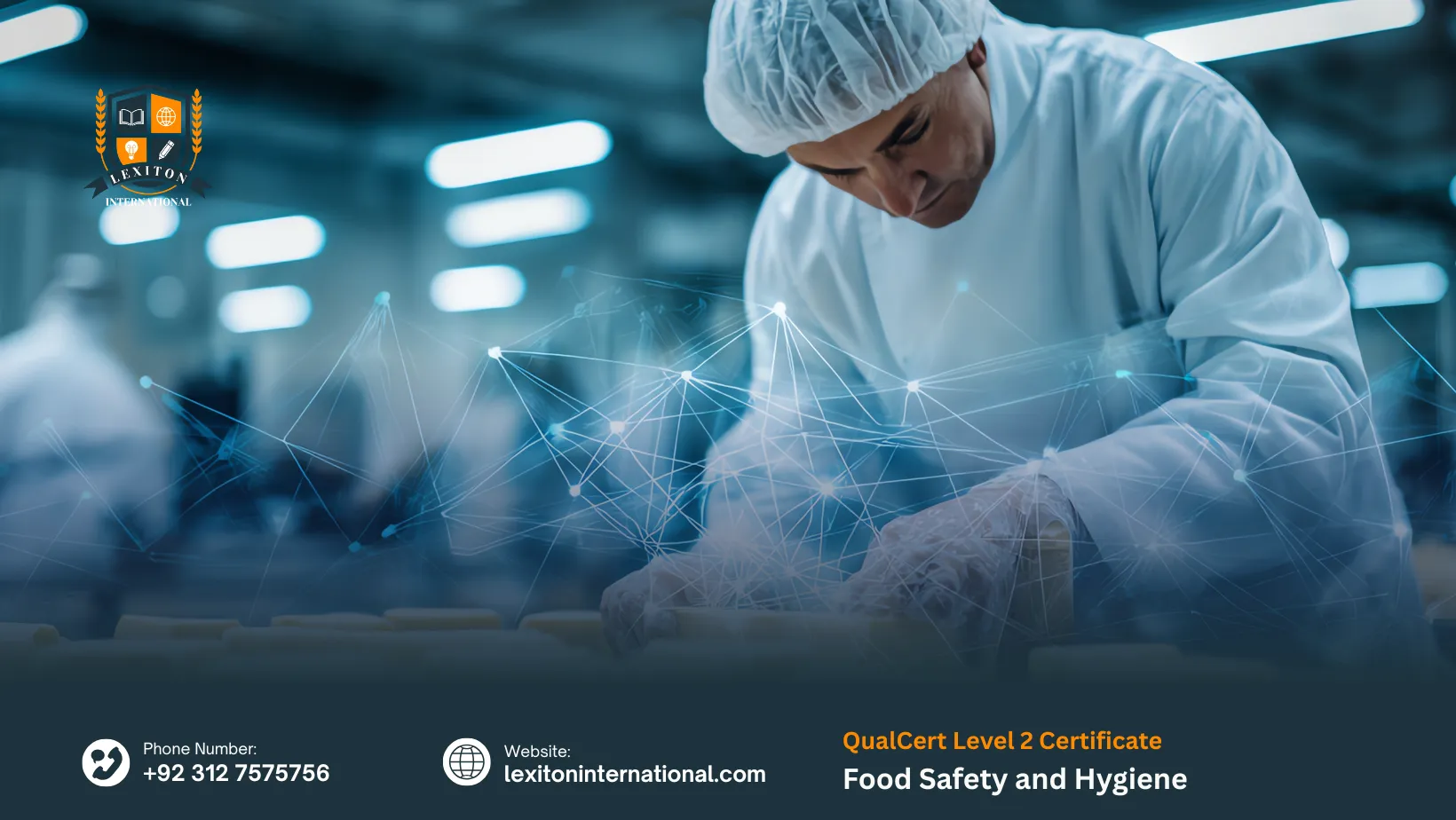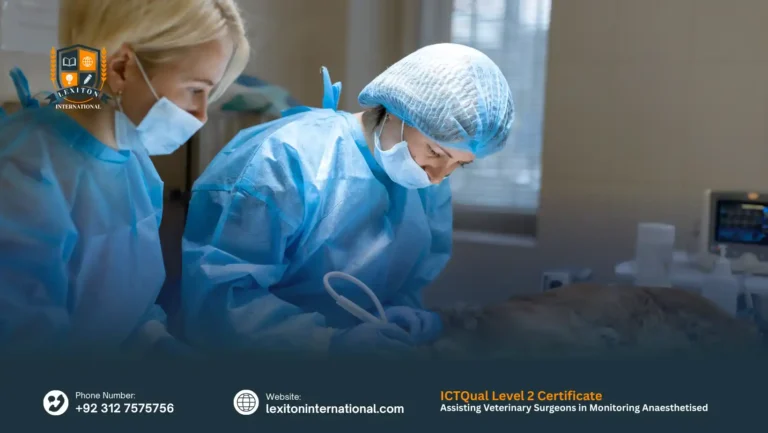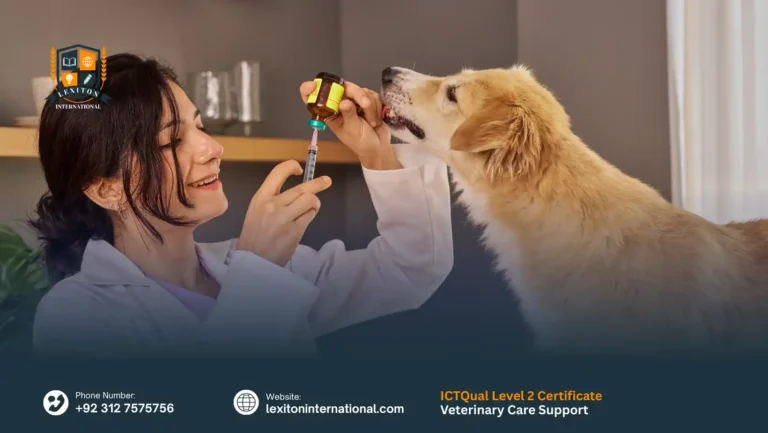The QualCert Level 2 Certificate in Food Safety and Hygiene is a foundational qualification designed to provide learners with essential knowledge and practical skills in maintaining high standards of food safety in a variety of environments. This course equips participants with an understanding of the principles of food hygiene, safe food handling practices, and the regulatory requirements that govern food safety in the workplace. Learners will gain the confidence to identify potential hazards and implement procedures to prevent food contamination.
The course covers key topics such as personal hygiene, cleaning and sanitation practices, safe storage and preparation of food, temperature control, and the prevention of foodborne illnesses. Through a combination of theory and practical examples, learners will develop the competence to manage everyday food safety risks effectively. The program also introduces learners to the legal responsibilities of food handlers and the importance of maintaining documentation and records to demonstrate compliance with food safety standards.
Upon completion, learners will be prepared to work in a wide range of settings including restaurants, catering services, food production facilities, and hospitality establishments. The qualification is ideal for individuals entering the food industry or those seeking to enhance their current role by demonstrating a commitment to food safety and hygiene. By completing this certificate, learners will contribute to safer food practices, protect public health, and enhance the reputation of the organization they serve.
The QualCert Level 2 Certificate in Food Safety and Hygiene is designed for individuals seeking foundational knowledge in food safety and hygiene practices. To ensure learners gain maximum benefit, certain educational, professional, and language requirements are recommended.
- Age Requirement:
Learners should ideally be 16 years or older, making the course suitable for school leavers, trainees, and early-career professionals in the food industry. - Educational Background:
A minimum of secondary education or equivalent is recommended. No prior qualifications in food safety are required, making this course suitable for beginners. - Work Experience:
While previous experience in food preparation, catering, or hospitality is beneficial, it is not mandatory. Individuals with an interest in food safety and hygiene are encouraged to enrol. - English Language Proficiency:
Learners should have a basic understanding of spoken and written English to comprehend course materials, instructions, and assessments effectively. - Interest in Food Safety:
Candidates should demonstrate a keen interest in learning about safe food handling, hygiene practices, and regulatory requirements, as the course provides essential skills for entry-level food safety roles. - Commitment to Learning:
Participants should be motivated to complete course modules, engage in practical activities, and apply food safety principles in real-world settings.
Mandatory Units
The QualCert Level 2 Certificate in Food Safety and Hygiene offers 15 Credits, requiring a Total Qualification Time (TQT) of 75 hours, including 50 Guided Learning Hours (GLH). Aimed at professionals looking to enhance their food safety knowledge and workplace compliance.
Upon successful completion of the QualCert Level 2 Certificate in Food Safety and Hygiene, participants will have achieved the following learning outcomes, equipping them with valuable skills and knowledge in the field of quality control:
Food Safety Laws and Regulations
- Understand the key national and international laws governing food safety and hygiene.
- Identify the responsibilities of food handlers and businesses under food safety legislation.
- Recognize the importance of compliance with legal and regulatory requirements.
- Explain the consequences of non-compliance on public health and business reputation.
- Apply basic legal principles to maintain safe food practices in the workplace.
Food Storage and Temperature Control
- Understand the principles of safe food storage to prevent contamination and spoilage.
- Identify appropriate storage conditions for different types of food.
- Apply temperature control methods, including monitoring and recording, to ensure food safety.
- Recognize the effects of improper storage on food quality and safety.
- Implement procedures to minimize risks associated with storage and handling.
Risk Assessment and Hazard Control
- Understand the concepts of food hazards, including biological, chemical, and physical risks.
- Identify potential hazards in food handling and preparation areas.
- Apply basic risk assessment techniques to control and prevent foodborne illnesses.
- Develop strategies to manage and reduce risks in food operations.
- Monitor and review hazard control measures to ensure effectiveness.
Safe Food Preparation and Handling
- Demonstrate proper personal hygiene practices for food handlers.
- Apply safe food preparation methods to prevent contamination.
- Understand cross-contamination and implement controls to prevent it.
- Use correct techniques for cleaning, sanitizing, and handling equipment and surfaces.
- Ensure compliance with hygiene practices during all stages of food preparation.
Implementation of HACCP in Food Businesses
- Understand the principles and benefits of Hazard Analysis and Critical Control Points (HACCP).
- Identify critical control points in food preparation and handling processes.
- Develop and implement basic HACCP plans in food businesses.
- Monitor and record critical limits to maintain food safety standards.
- Evaluate and review HACCP systems to ensure continuous compliance and improvement.
The QualCert Level 2 Certificate in Food Safety and Hygiene is suitable for a wide range of individuals who want to build knowledge and practical skills in food safety and hygiene. The course is ideal for beginners as well as professionals in the food industry seeking to enhance their expertise.
School Leavers and Early Career Professionals
- Individuals aged 16 or older entering the food industry.
- Trainees seeking foundational knowledge in food safety and hygiene.
- Beginners who want to pursue a career in catering, hospitality, or food production.
Food Industry Employees
- Kitchen staff, chefs, catering assistants, and food handlers.
- Workers in restaurants, hotels, cafes, or food manufacturing facilities.
- Employees aiming to improve hygiene practices and comply with regulatory standards.
Supervisors and Managers
- Individuals planning to take on supervisory roles in kitchens or food service establishments.
- Learners seeking to understand legal responsibilities and food safety management.
- Professionals aiming to ensure team compliance with hygiene standards.
Career Changers
- Individuals transitioning into the food industry from other sectors.
- People interested in developing basic food safety knowledge to meet industry requirements.
- Learners aiming to enhance employability with recognized food safety certification.
Hospitality and Catering Professionals
- Front-of-house staff requiring knowledge of food handling and hygiene standards.
- Catering managers and event coordinators ensuring safe food practices.
- Staff responsible for maintaining safe dining and food service environments.
Food Production and Manufacturing Staff
- Employees working in factories, processing plants, and packaging facilities.
- Workers handling raw materials, storage, and finished products.
- Staff responsible for implementing hygiene protocols and monitoring compliance.
Motivated Learners
- Candidates with an interest in public health, food hygiene, and safe handling practices.
- Individuals committed to learning and applying food safety principles effectively.
- Learners who value continuous improvement and professional development in the food sector.
Completing the QualCert Level 2 Certificate in Food Safety and Hygiene opens several academic, professional, and career advancement opportunities for learners seeking growth in the food industry.
Higher-Level Food Safety Qualifications
- Progress to QualCert Level 3 Certificate in Food Safety and Hygiene for advanced knowledge.
- Access specialized courses in food safety management and hygiene practices.
- Enhance expertise in managing complex food safety processes.
- Prepare for supervisory roles with deeper technical understanding.
- Gain credentials recognized by industry and regulatory bodies.
Career Advancement in Food Handling
- Move into supervisory or team leader positions in kitchens, catering, or food service.
- Take responsibility for monitoring compliance with hygiene standards.
- Lead teams in maintaining safe food preparation and handling practices.
- Improve employability with a formal food safety qualification.
- Demonstrate competency for managerial or coordination roles.
Hospitality and Catering Opportunities
- Apply for roles in restaurants, hotels, and catering businesses.
- Work as kitchen assistants, food handlers, or catering staff with enhanced skills.
- Take on responsibilities for food storage, preparation, and safety monitoring.
- Support compliance with legal and regulatory standards in hospitality environments.
- Progress toward roles in larger hospitality chains or event management companies.
Food Production and Manufacturing Roles
- Gain eligibility for positions in food processing, packaging, and manufacturing facilities.
- Contribute to quality control, hygiene monitoring, and process improvement.
- Support adherence to health and safety regulations in production settings.
- Progress toward supervisory positions within manufacturing teams.
- Develop skills relevant to large-scale food safety management.
Specialized Training and Certifications
- Pursue HACCP certification and training for risk management in food businesses.
- Enroll in allergen management or advanced hygiene courses.
- Access professional development opportunities in quality assurance and compliance.
- Enhance credentials for international food safety standards.
- Prepare for further technical or managerial qualifications in the food sector.
Entrepreneurial Opportunities
- Apply knowledge to start a small catering or food business with safe practices.
- Implement food safety systems to meet legal and customer requirements.
- Establish credibility and trust in the food market.
- Enhance business reputation through certified food hygiene practices.
- Build a foundation for long-term growth in food-related entrepreneurship.
Public Health and Compliance Roles
- Develop skills for positions in regulatory bodies or health inspection roles.
- Assist in monitoring compliance with food safety regulations.
- Support public health initiatives by promoting safe food practices.
- Contribute to reducing foodborne illness risks in communities.
- Prepare for advanced roles in food safety auditing and policy enforcement.
Curious About This Course?







